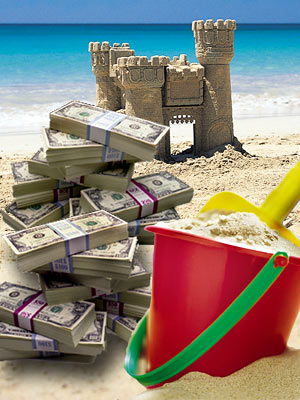Last year, Greek magazine editor Kostas Vaxevanis published in his magazine Hot Doc a list of 2,000 wealthy Greeks who were hiding taxable savings in the Geneva branch of HSBC. The list had been furnished years earlier by the then French finance Minister Christine Lagarde to the Greek government, who did nothing in regards to chasing after the money or the offenders (the list has since been labelled the “Lagarde List”). In fact, one former Greek finance minister, George Papaconstantinou, claimed that he had “lost” the list. He is currently being investigated by Greek’s parliament for altering the list to remove some of his relative’s names on it.
After Vaxevanis published the list, Greek prosecutors decided to charge him. Last November he was acquitted, before prosecutors then decided to have another run at him and recharge the editor. He now faces, this fall, a return date to court. “The Lagarde list is not only a list of potential tax dodgers,” Vaxevanis has written. “It captures the way corruption functions in Greece — with, unfortunately, the support of the political system.”
Indeed, the insanity of this case highlights the Kakfaesque world that exists surrounding taxing corporations and the wealthy, combined with Western governments’ drive to embrace austerity measures. Greece, in fact, is imploding as the government slashes and burns and sells off state assets, entering its seventh year of recession with GDP continuing to fall, while increasingly embracing undemocratic measures. The Golden Dawn fascist party is gaining ground as the crisis deepens as they blame “immigrants” on their current set of woes.
Greece got into its current fix because its government borrowed too heavily and then decided not to collect sufficient taxes to pay back its lenders. What has become obscured in the mess is the rampant abuse by Greek’s wealthy and private sector of offshore tax havens. It turns out that the richest 1 per cent of the population reportedly stashed away anywhere from 20 billion to 45 billion Euros in Swiss banks alone, and the number of Greek-owned offshore companies tops 10,000, (which are used to evade taxes) while the government estimates the evasion of tax and social-security contributions costs Greece 30 billion Euros a year.
Tax evasion or avoidance by the wealthy and corporations is such a massive problem that last week a report prepared for the G20’s finance ministers said governments face “global tax chaos” as they chase dwindling revenues from multinational companies unless the international tax regime is radically overhauled. What the G20 is now seeing is how adept the corporate sector and the 1 per cent have become at moving their profits offshore and beyond the purview of tax collectors. Companies like GE, Starbucks, Amazon, Apple, Wells Fargo, Google, Microsoft, Bank of America, Exxon/Mobil, Chevron, Citigroup, Caterpillar, the entire pharmaceutical industry — let alone people like Mitt Romney, Paul Martin Jr., and the Bronfmans — use a variety of means to pay low to sometimes no taxes using offshore havens.
Earlier this year, 2.5 million files and 120,000 companies and trusts who use offshore tax havens was revealed by the International Consortium of Investigative Journalists (ICIJ) that caused an international furor. What also became apparent when this list was revealed was, that like the Lagarde list, governments had access to this information for years and were not doing anything to hunt down these funds. In fact, the Harper government has eschewed all efforts to pursue this money, while at the same time laying off 3,000 tax collectors at the CRA this budget year.
“The offshore system is the secret underpinning for the political and financial power of Wall Street today. It is the fortified refuge of big finance,” Nicholas Shaxson, author of Treasure Islands, a 2011 book on offshore tax havens, has said. And he is quite right.
Today, the Organization for Economic Co-operation and Development (OECD) claims that offshore banks globally hide some (US) $5-trillion to (US) $7-trillion from tax authorities, or about 8 per cent of the world’s assets under management. Moreover, an estimated (US) $11.5-trillion is being stashed in offshore accounts worldwide for one reason or another.
Now governments talk about the so-called “tax gap” — the difference between what they could collect and do collect — caused by the use of offshore havens. In the U.K., this estimate ranges from £50 billion to £100-billion annually. Of that, about £20-billion sits in offshore tax havens. Meanwhile, though, the CRA refuses to make an estimate of the tax gap in Canada, but it’s safe to say if they did they would find it’s in the many tens of billions.
The offshore tax haven issue speaks to one of the Great Lies currently promulgated by conservative, liberal and even social democratic governments: which is that governments are broke. And hence they must lay off civil servants, impose cuts and wage restraints on the public sector. And it is why governments are desperately trying to avoid the issue: after all, they’ve all encouraged tax evasion and avoidance by offering corporations and the wealthy lower and lower taxes and greater tax breaks over the years. Now they are reaping what they have sown.
Photo: thetaxhaven/flickr




